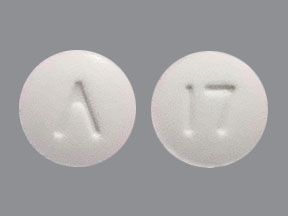
Metolazone Coupons & Savings Card – Discount Prices from $16.39
Metolazone is a thiazide-like diuretic, commonly known as a "water pill," designed to help your body eliminate excess fluids by increasing urine output. It is primarily used to manage high blood pressure, which can aid in preventing strokes, heart attacks, and kidney issues. Additionally, Metolazone effectively reduces swelling (edema) associated with conditions like heart failure and kidney problems, thereby alleviating symptoms such as difficulty breathing. This medication is taken orally, usually once a day. While it is generally safe, some individuals may experience side effects like dizziness or an imbalance in electrolytes. Always consult with your healthcare provider before starting any new medication to ensure it is safe and appropriate for your condition.
Our coupons are free to use. Before paying, show the pharmacist your Metolazone savings card to get your free discount. Use our filters below to edit the prescription box to match your needs. The Metolazone prices will update based on your prescription needs. Above our Metolazone coupons, you can change your location to see pharmacy prices and costs in other areas. We're here to help you buy Metolazone at the lowest price with our prescription discount card.
My prescription
Edit
2.5MG, Metolazone (30 Tablets)
Select pharmacy

CVS
$26.35
COUPON PRICE
Albertsons
$16.39
COUPON PRICE
Walmart
$17.42
COUPON PRICE
Walgreens
$24.27
COUPON PRICEMetolazone savings card
Show this card to your pharmacist
Albertsons
$16.39
BIN
ID
PCN
GRP
011867
LH572364C0
HT
LABH001
Powered by
Metolazone is a thiazide-like diuretic, commonly known as a "water pill," designed to help your body eliminate excess fluids by increasing urine output. It is primarily used to manage high blood pressure, which can aid in preventing strokes, heart attacks, and kidney issues. Additionally, Metolazone effectively reduces swelling (edema) associated with conditions like heart failure and kidney problems, thereby alleviating symptoms such as difficulty breathing. This medication is taken orally, usually once a day. While it is generally safe, some individuals may experience side effects like dizziness or an imbalance in electrolytes. Always consult with your healthcare provider before starting any new medication to ensure it is safe and appropriate for your condition.
Our coupons are free to use. Before paying, show the pharmacist your Metolazone savings card to get your free discount. Use our filters below to edit the prescription box to match your needs. The Metolazone prices will update based on your prescription needs. Above our Metolazone coupons, you can change your location to see pharmacy prices and costs in other areas. We're here to help you buy Metolazone at the lowest price with our prescription discount card.
Related thiazide-like diuretics prescriptions
coupons from$24.35Save 18%
coupons from$27.45Save -3%
More prescriptions for hypertension
coupons from$3.84Save 91%
coupons from$35.39Save 83%
coupons from$27.32Save 75%
coupons from$14.97Save 74%
coupons from$9.79Save 72%
coupons from$9.79Save 72%
coupons from$2098.39Save 22%
coupons from$7.85Save 93%
Related thiazide-like diuretics prescriptions
Indapamide Save 18%coupons from $24.35
Chlorthalidone Save -3%coupons from $27.45
More prescriptions for hypertension
Lisinopril-hydrochlorothiazide Save 91%coupons from $3.84
Hydralazine Save 83%coupons from $35.39
Accuretic Save 75%coupons from $27.32
Trandolapril Save 74%coupons from $14.97
Zestril Save 72%coupons from $9.79
Lisinopril Save 72%coupons from $9.79
Innopran Xl Save 22%coupons from $2098.39
Avalide Save 93%coupons from $7.85
Metolazone dosage forms
Use our Metolazone 2.5MG coupon with prices from $17.42 for 30 Tablets. You can also use our Metolazone 2.5MG coupon with prices from $2.78 for 1 Tablet. We have a Metolazone 2.5MG coupon with prices from $5.03 for 9 Tablets. You can use our Metolazone 2.5MG coupon with prices from $35.40 for 100 Tablets.
Dosage Quantity Price from Per unit 2.5MG 30 Tablets $17.42 $0.58 2.5MG 1 Tablet $2.78 $2.78 2.5MG 9 Tablets $5.03 $0.56 2.5MG 100 Tablets $35.40 $0.35 2.5MG 9000 Tablets $845.30 $0.09 5MG 1 Tablet $2.85 $2.85 5MG 30 Tablets $13.10 $0.44 5MG 100 Tablets $37.08 $0.37 5MG 1000 Tablets $134.10 $0.13 5MG 9000 Tablets $996.50 $0.11
| Dosage | Quantity | Price from | Per unit |
|---|---|---|---|
| 2.5MG | 30 Tablets | $17.42 | $0.58 |
| 2.5MG | 1 Tablet | $2.78 | $2.78 |
| 2.5MG | 9 Tablets | $5.03 | $0.56 |
| 2.5MG | 100 Tablets | $35.40 | $0.35 |
| 2.5MG | 9000 Tablets | $845.30 | $0.09 |
| 5MG | 1 Tablet | $2.85 | $2.85 |
| 5MG | 30 Tablets | $13.10 | $0.44 |
| 5MG | 100 Tablets | $37.08 | $0.37 |
| 5MG | 1000 Tablets | $134.10 | $0.13 |
| 5MG | 9000 Tablets | $996.50 | $0.11 |
| 10MG | 10 Tablets | $6.41 | $0.64 |
| 10MG | 90 Tablets | $42.00 | $0.47 |
| 10MG | 100 Tablets | $43.74 | $0.44 |
